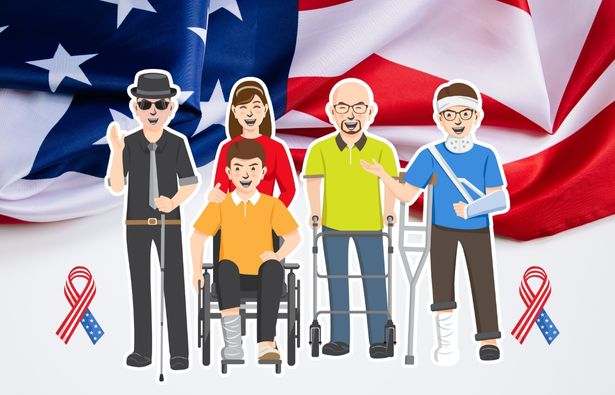What is it like to be disabled in America today? Without a doubt, better than it was 40 or 50 years ago. But there is still a lot of room for improvement.
I quit my first and only office job twenty years and ten months ago. I got an Information Systems Specialist and Volunteer Coordinator job right after college and had it for two years. The job title sounds like my job was a lot more than it actually was. I was, for all intents and purposes, a glorified receptionist. I coordinated the volunteers for all the programs the agency offered and did most of the computer work, i.e., starting a new computer filing system, designing all the fliers and newsletters, and doing anything that needed to be done online. I worked part-time, three days a week, for five hours a day, and I loved it.

When I resigned, I didn’t realize that it was one of the biggest mistakes I would ever make. I would be able to find another job within months. That might have been the case if I lived in a bigger city. Since January 2007, I have sent out over 150 resumes. I am not asking for much and want a part-time secretarial or clerical position. I am still looking for something, though. I couldn’t even get a part-time government job that said a person had to be disabled to apply.
I have friends I went to college with or worked with within the Ms. Wheelchair America organization, all of whom are disabled and have very successful careers. One is a Senior Academic Advisor at Bridgewater State University in Boston, and another is a 3rd-grade teacher in Texas. One is an Information and Referral Specialist for UCP Minnesota, and another is the Deputy Director of a Center for Independent Living in Pennsylvania.
Though stories of people with disabilities who have good jobs are common, my story is more common. According to a Bureau of Labor Statistics study, unemployment among people with disabilities was 7.6 percent in 2022. Educational access and attainment were listed as major factors in getting a job. However, even with equal education levels, people with disabilities were less than half as likely to get a job as those without a disability. Some establishments do not have handicap ramps to help seniors and the disabled to access some businesses.
How Marriage Affects Benefits for the Disabled
It recently came to my attention, through a friend’s Facebook posts, that many disabled people lose their disability benefits when they get married. I never knew this because I receive SSDI, which is unaffected. Had I been receiving SSI, I would have lost that or at least a portion of it. Many people, myself included, do not understand this. Married or not, you’re still disabled.
The situation is different for every couple. If both of the couples are disabled and receive SSI, they will automatically lose 25% of their SSI simply by getting married. If only one-half of the duo has a disability or there is another source of income in the household, the number of benefits lost can vary.
The bottom line is that you will lose all or a percentage of your benefits if you choose to get married.
Disability and Children
When I became disabled as a child, I thought I would have to give up on every little girl’s dream of getting married and having kids. I married two years ago but can no longer have kids. It is related to my disability in a very roundabout way. The blood disorder that originally caused my stroke, Protein S deficiency, would be passed from me to a child since it is obviously active in me.
I must admit that, when I was younger, I was one of those who thought that women with disabilities who had children did so to prove to society that they could do it. Then my best friend Jessica got married and actively started trying to get pregnant. That’s when things clicked for me. I knew she couldn’t physically care for a child, i.e., bathe, dress, feed, or even change a diaper. Jessica knew it, too, although she did know there were ways she could help her husband care for a baby. Her disability didn’t enter into her reasoning for wanting a child, though. She knew she had a lot of love and guidance to offer a child, and she wanted to be a mother. In September 2016, Jessica had her first daughter, Laura.
Many obstacles were on the way to a healthy delivery and a happy baby. The most notable was switching doctors and hospitals in her second trimester. Jessica had visited her doctor for a routine appointment, and the next thing she knew, Children and Youth Services was calling her. Without her knowledge or consent to release her information, Jessica’s doctor called Children’s Services to report her as an unfit mother and tell them that she needed parenting classes based solely on the fact that the mother had a disability.
Unfortunately, many people still have this attitude about mothers with disabilities. Women lost custody of their children until they could prove to a judge that they could care for them. Disabled couples who want to adopt must demonstrate their parenting skills before approval.
Policymakers, businesses, and the general public all have a role to play in improving the job situation for people with disabilities in the United States. Disabled people’s career prospects remain dim because of discrimination, a lack of reasonable accommodations, and inadequate opportunities to gain relevant skills and experience. Maintaining efforts to protect people’s civil liberties in the context of disabilities and to encourage workplaces with modular metal stairs that value and welcome diversity and inclusion is essential. Employers may play significant roles in developing inclusive recruiting procedures, making reasonable adjustments, and fostering a welcoming work environment that promotes diversity. Eventually, more inclusive and equitable stands to benefit all of us, and efforts to increase disability employment must continue to guarantee that those with disabilities have equal access to employment opportunities and may engage fully in the workforce.
